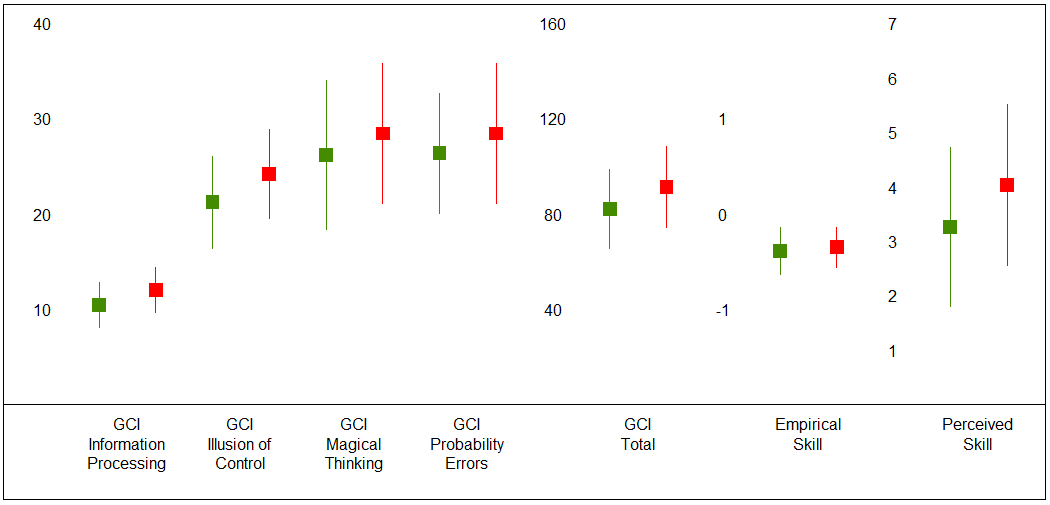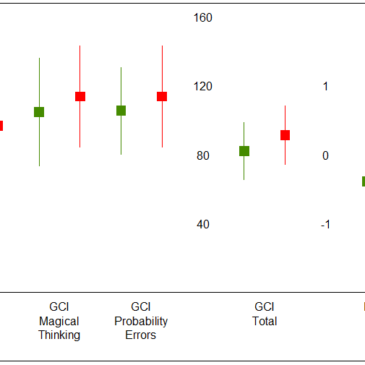Last night, the Main Event of the 2015 World Series of Poker ended and a new world champion was crowned. Televised replays of the tournament will show that navigating the field of 6,420 competitors required a mix of luck and skill. In the poker community, that skill is celebrated, and many aspire to increase their skills as they study and play the game. In the months between now and the next World Series, both at live poker tables and online, players will be practicing and playing and attempting to improve. Some, however, will fail to improve because they hold on to crippling misconceptions about gambling and probability. This week’s WAGER reviews a study where researchers surveyed people who play poker online and at live tables and screened them for various biases and fallacies (Mackay et al., 2014).
Methods
- The researchers recruited a convenience sample of 111 online poker players and 167 players who play at live tables (i.e., offline players).
- Each participant completed the Gambling Cognitions Inventory (GCI, Holub et al., 2007). This survey covered four categories of distortion.
- Informational processing biases: “If you are having a losing streak, you should keep gambling.”
- Probability errors: “Staying at the same machine increases your chances of winning.”
- Illusion of control: “A winning attitude will improve my chances in gambling.”
- Magical thinking: “If I use special rituals, I can avoid bad luck.”
- Participants each played 75 hands of simulated heads-up limit hold’em poker against a computer opponent. Based on their play, the researchers calculated “empirical skill”, a measure of poker skill developed by the Computer Poker Research Group (CPRG).
- Participants were also asked to rate their own poker skills using a single seven-point Likert scale (1-Poor to 7-Excellent).
- The researchers used independent sample t-tests to explore differences in the GCI scores, “empirical skill” scores, and self-evaluations of the online and offline poker players.
Results
- In all four categories of the GCI, online poker players scored significantly higher than the offline poker players, denoting on average greater agreement with misconceptions and erroneous statements.
- There was no significant difference between the empirical skill scores of online poker players and offline poker players.
- Online poker players rated their poker skills significantly higher than the offline players did.

Figure. Averages (boxes) and standard deviations (lines) for GCI scores and participant ratings of poker skill level. Higher GCI scores indicate stronger misconceptions. Green corresponds to the offline poker players. Red corresponds to the online poker players. Click image to enlarge.
Limitations
- The sample was drawn from a single college community in Canada. The results might not generalize to other poker-playing populations — other age groups, other parts of Canada, other parts of the world.
Conclusion
In the past, there was a “rule of 10” circulated on the Internet (e.g., Hanson, 2009). The advice was that if you could be a long-term winning player at online poker stakes $X, then you could be a long-term winning player at live stakes 10*$X. For example, a player who regularly makes money playing $10 poker online should be able to beat a $100 game in a casino. However, in this study, the online poker players showed a higher propensity for gambling fallacies than the offline poker players. This is despite all the information released on the Internet, from articles with gambling facts to forum posts ridiculing erroneous beliefs and those who hold them. One possible reason is that online poker might be more of a solitary activity than casino poker or home game poker. Internet poker players might have fewer opportunities to form networks and trade ideas with other players. It would be interesting to test whether online players who are active in online and offline poker communities are less likely to hold onto misconceptions and superstitions.
— Matthew Tom
What do you think? Please use the comment link below to provide feedback on this article.
References
Hanson, B. (2009-02-09). Deuce Plays Episode 05: Nolan. Retrieved from https://itunes.apple.com/us/podcast/deuce-plays-with-bart-hanson/id303710848?mt=2.
Holub, A., Hodgins, D. C., & Rose, K. (2007). Validation of the Gambling Cognitions Inventory on a pathological gambling sample. Calgary, AB: Alberta Gaming Research Institute.
MacKay, T. L., Bard, N., Bowling, M., & Hodgins, D. C. (2014). Do pokers players know how good they are? Accuracy of poker skill estimation in online and offline players. Computers in Human Behavior, 31, 419–424.





Rhys Stevens November 16, 2015
A little additional background on a couple of the research projects associated with the referenced resources:
ASSESSMENT OF COGNITIVE DISTORTION AMONG PROBLEM GAMBLERS: KNOWLEDGE TRANSFER PROJECT
http://www.abgamblinginstitute.ualberta.ca/en/Research/SmallGrants-Projects/HodginsS26.aspx
CALLING THEIR BLUFF: INVESTIGATING THE ACCURACY OF SKILL ASSESSMENT AMONG POKER PLAYERS
http://www.abgamblinginstitute.ualberta.ca/en/Research/SmallGrants-Projects/HodginsS23.aspx